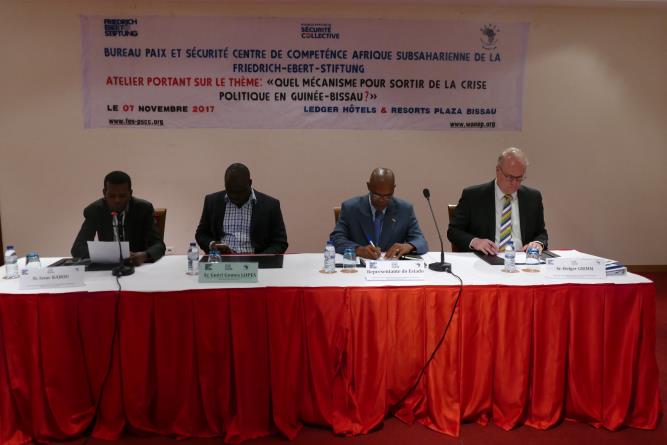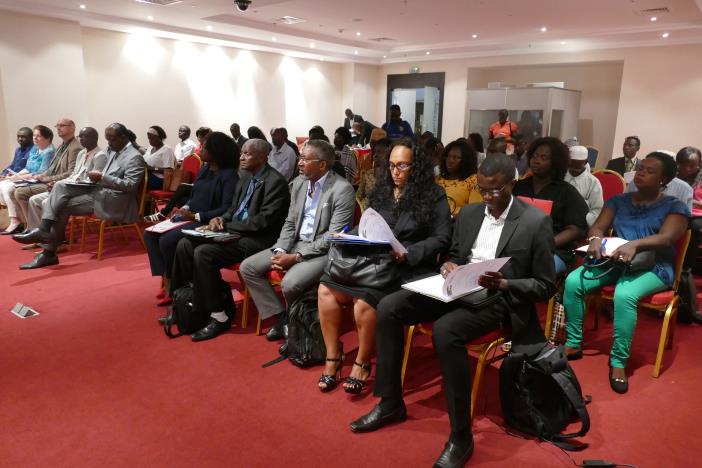Workshop on the theme “What mechanism for a way out of the political crisis in Guinea-Bissau?”
At the opening of this workshop, the organizers WANEP Guinea-Bissau and the Friedrich-Ebert-Stiftung Peace and Security Centre of Competence Sub-Saharan Africa, in their words of welcome, set the scene and the objectives of this meeting. Following them, the representative of the State, Mr. Osiris FEREIRA, judge advisor to the Supreme Court of Justice, in his speech, expressed the interest that the Bissau-Guinean people have, to unite to build a stable political, economic and social environment, indispensable for sustainable development.
The theme, which was the subject of the workshop, was introduced by Professor Carlos CARDOSO, who highlighted several factors that are often at the origin of instability in Guinea-Bissau. His analysis of information collected from ECOMIB forces, ECOWAS reports, the United Nations, books and some academic textbooks revealed that Guinea-Bissau is a fragile State with different events that have marked its history. According to the professor, the country has several natural resources that arouse envy from some national and international political actors to have a hand on these different resources. Similarly, there are significant structural factors such as: its geographical characteristics; its socio-cultural aspects; its economic potentialities; drug traffic; its system and political history that can hinder its stability.
At the end of his presentation, the debate was opened. Its richness is due to the various points of view of the participants. Some of the reactions include:
- "The Prime Minister must be a person of consensus but in good relation with the Head of State" and "The unconditional reinstatement of the fifteen (15) deputies expelled from the African party for the independence of Guinea and Cape Verde ( PAIGC) but, in accordance with the Party Statute "which, according to participants, are confusingly worded in the application of the Conakry Agreement;
- The law, which does not allow the coalition between political parties after the elections but rather before. Just to mention the fact that the fifteen deputies expelled from the (PAIGC) can not join the deputies of the Party of Social Renovation (PRS) to constitute a majority in the hemicycle.
- The fact that any weak state like the case of Guinea-Bissau is fertile ground for drug trafficking that rhymes with corruption, terrorism and insecurity.
- The costly intervention of ECOWAS in Guinea-Bissau. ECOWAS has only been able to raise about 16% of this budget.
- The solution to the current political crisis in Guinea-Bissau remains in the hands of a dozen of the country's political elite.
A range of recommendations was formulated at the end of this workshop:
- It takes political will to move towards a frank and sincere dialogue between the various stakeholders of the Bissau-Guinean society;
- Engage the process of defense and security sector reform with the support of the international community;
- An involvement of the civil society in the search of the solution to the political crisis which must remain very far from the political thing in order to be able to claim the interests of the Bissau-Guinean population;
- The dissolution of the National People's Congress and the organization of general elections;
- Propose a transition period of five (05) years to proceed with the structural reform of all state institutions before moving towards the organization of general elections;
- Work to ensure that the wealth of the country are beneficial to the entire population;
- The revision of the electoral law;
- Try to find an African solution, that is, to reunite the political elite of this country with the tomb of Amilcar Cabral;
- The adoption of a new system, that is, abandoning the current semi-presidential system to adopt the presidential system;
- Women's involvement in politics so that they can access the highest decision-making bodies;
- Adopt a policy of awareness with respect to civil society human rights.
At the end of these discussions, the need for a frank and sincere dialogue was unanimously shared by all participants. But before, it is essential that political elites understand that dialogue is synonymous with concession on both sides of the protagonists.
Friedrich-Ebert-Stiftung
Peace and Security Centre of Competence Sub-Saharan Africa
Point E, Rue de Fatick x Boulevard de l'Est,
Residence Bity Lokho, 6th floor
B.P. 15 416
Dakar - Fann




